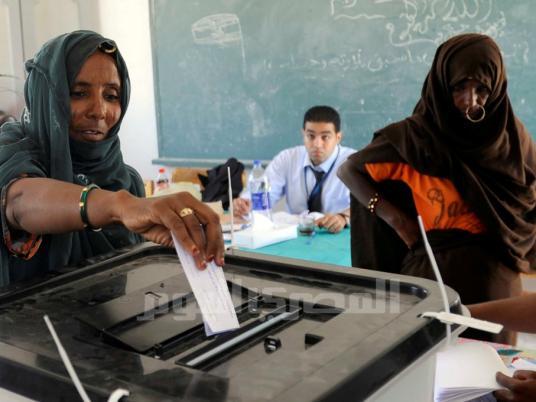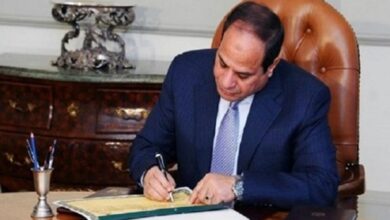
Seventy-seven former MPs associated with Hosni Mubarak's dissolved National Democratic Party (NDP) have banded together to run in the forthcoming parliamentary elections, and they say that they are attracting more candidates to their cause. Most of the 77 were members of the party, and the remainder joined its parliamentary bloc.
In elections held under Mubarak, it was common for a candidate to be described as independent when he or she was actually a member of the NDP.
In the 2000 parliamentary election, 310 members of the NDP won seats, 166 of whom ran as independent candidates and then joined the NDP’s parliamentary bloc. The same happened in 2005, when 170 of the 349 members of the NDP who won in the polls had originally run as independents.
The 77 former parliamentarians decided to form an alliance in late September named the “People’s Representatives.” The alliance brings together former independent candidates as well as “NDP independents” who ran in the 2000 and 2005 parliamentary elections.
They say they are not “feloul,” or remnants of the former regime, and that they only joined the NDP under pressure to provide services to their constituents.
Gamal Abdel Maqsoud, who ran as an independent candidate in the 2000 and 2005 elections and then joined the NDP’s bloc, says, “Joining the NDP did not mean that I adopted its policies — I only carried the party’s membership card and sat next to MPs from the NDP in Parliament.
“Even if I voted in favor of some of the pieces of legislation proposed by the party, in the end I served my constituents by providing services to them because my membership enabled me to have broad contacts with government officials,” he adds.
In the first post-revolution parliamentary election, held from November 2011-January 2012, there were only a limited number of independent candidates running for office, and Islamists affiliated with several parties garnered more than 70 percent of seats.
Some former NDP members ran on the lists of the Wafd Party and the Egyptian Bloc, which brought together a number of civilian parties. Parties that splintered from the NDP won only 17, or 3 percent, of Parliament’s 508 seats.
Members of the fledgling alliance say the harsh attack on former NDP members before the last election and the smear campaign launched by other political movements, particularly Islamists, which warned people not to give their votes to feloul, discouraged most of them from running and caused those who did run to lose.
Haidar Baghdady, a former independent MP in the 2000 and 2005 parliaments who reached the run-offs in the 2011 vote, says Islamists seized the majority of seats in Parliament because they purchased votes by distributing money and food, while he did not.
“All I spent in the last election was LE50,000. I do not win votes by giving money to the voters because they know me. However, the money distributed and the media campaign launched by the Islamists against independent candidates prevented me from winning,” Baghdady claims.
Although Abdel Maqsoud did not run in the previous election, he says the next election will be different.
“The people have seen the poor performance of the previous People’s Assembly,” he says. “In addition, we have learned that citizens have complained about the few services provided to them by the elected MPs. This will eventually be in our interest because we are service MPs and that is what the people want.”
Members of the alliance are currently conducting visits to villages and cities in the Delta and Upper Egypt to meet with public figures and heads of large families to gather nominees.
“We started the tour with 77 candidates, and now we are 190. Our goal is to nominate 200 candidates to run for seats allocated to independents to ensure that at least half of them will win and so we would have 100 MPs in the coming People’s Assembly,” Abdel Maqsoud explains.
Members of the alliance prefer the exclusive implementation of the single-winner system, as in the 2000 and 2005 polls.
In the past election, two-thirds of the seats, or 332 seats, were filled using the party-list system and the remaining one-third, 166 seats, was filled using the single-winner system.
So far, there is no final word on the rules which will be implemented in the next election as it remains unclear whether Law 108/2011 which determines the election system will be changed.
In June, the Supreme Constitutional Court invalidated some of the articles in the aforementioned law because it allowed party members to run for seats allocated for independents on the basis of the single member plurality (or “first past the post”) system, whereby the candidate with the greatest share of votes in a given constituency takes the seat. The court argued that allowing party members to compete for the seats diminishes the chances of independent candidates winning and thereby undermines the principle of equal opportunity.
“It is hardly astonishing that members of the alliance prefer the single [member plurality] system, since the party-list system better suits parties which depend on their ideologies to win votes, while independent candidates rely heavily on their personal contacts,” Emad Shaheen, professor of Political Science at the American University in Cairo, says.
“Regrettably, the election environment in Egypt has not changed. The MPs still think their role is to provide services rather than legislating even though [providing services] is the duty of elected local councils and not the People’s Assembly. This shows that [the People’s Representatives] alliance is merely an electoral alliance that has nothing to do with ideologies, just like the NDP.”
Translated from Arabic by Dina Zafer




